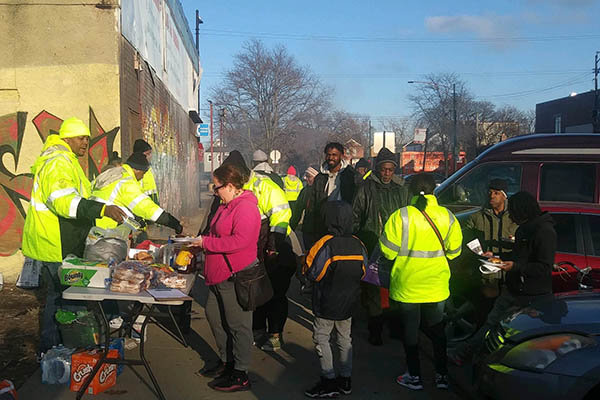Early Signs of Success for Chicago Street Outreach Collaboration
Collaboration reaches and helps those at high risk for gun violence
Get all our news

Street outreach workers, part of a Communities Partnering 4 Peace organization,
serve meals to neighborhood residents.
Individuals’ gun victimization dropped by nearly 20% after 18 months of participation in an innovative collaboration between organizations dedicated to curbing gun violence in Chicago, according to a new report from Northwestern Neighborhood & Network Initiative (N3) researchers.
The report by N3 examines the impact of Communities Partnering 4 Peace (CP4P), a Chicago collaboration of outreach and victim services organizations. Formed in 2017, CP4P now consists of 16 organizations in 28 different community areas. CP4P works to reduce gun violence among individuals who are most likely to be involved in gun violence, neighborhood disputes, and group conflict through the use of outreach workers and by providing employment, education, legal, and behavioral health services.
CP4P So Far
Since July 2017, CP4P has served about 3,600 participants across the city. Approximately 83% of them are Black, and 16% are Latino. Some 82% are male, and their average age is roughly 25 years old. The collaborative’s outreach workers and other service providers have made nearly 117,000 contacts with the participants.
N3 finds that CP4P successfully locates and engages the people at high risk for involvement in gun violence. The rates of gunshot victimization among the collaborative’s participants before participation was, on average, 60 times higher than the city average and nearly 25 times higher than other residents of CP4P neighborhoods.
Comparing participants over the same number of months before and after working with CP4P, N3’s research shows that, after 18 months with CP4P, participants’ levels of victimization were nearly 20% lower and nearly 31% lower over 24 months. Arrests of participants was 28% lower in the 18 months following participation, and nearly 17% lower in the 24 months after participating. However, CP4P participants remain at high risk for gun violence compared to the city as a whole, and even compared to other people in their own neighborhoods.
Earlier N3 research showed through interviews, surveys, and focus groups that CP4P participants turned to their outreach worker or victim service advocate for emotional support during “dark times” and for help with trauma resulting from gun violence. Participants also used CP4P organizations to obtain social services and legal support, as well as educational and employment opportunities.
The researchers emphasize COVID-19’s impact on outreach efforts and the preliminary nature of their findings.
N3 concludes that CP4P organizations show early signs of success. They effectively locate those people at highest risk of being victims of gun violence, potentially increase positive outcomes such as education and employment, and potentially reduce the risk of involvement in gun violence.
Read the complete report.
Photo credit: CP4P.
Published: September 10, 2021.


